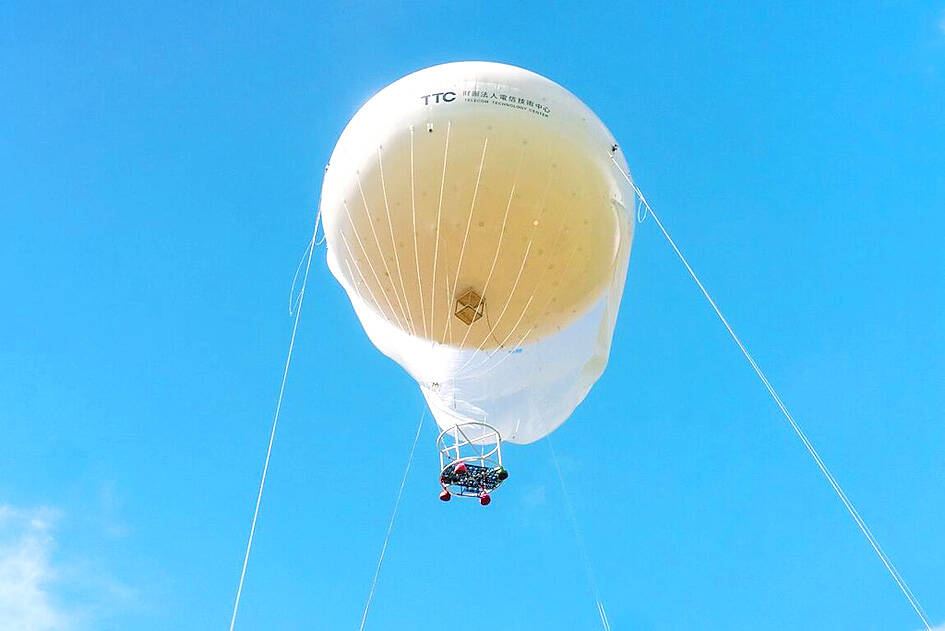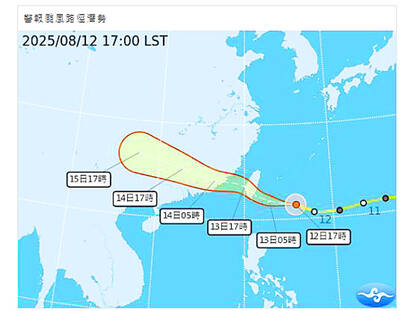The Ministry of Digital Affairs (MODA) yesterday unveiled Taiwan’s first domestically produced tethered high-altitude balloon, which can be used to restore communications in emergencies.
The high-altitude platform has the potential to quickly help restore communications after a disaster, boosting Taiwan’s network resilience, the ministry said.
At an unveiling ceremony at Taitung County’s Luye Highlands (鹿野高台), Minister of Digital Affairs Huang Yen-nun (黃彥男) said that high-altitude balloons are one of the viable solutions to build resilience in network communications, as Taiwan is faced with many natural disasters.

Photo: Liu Jen-wei, Taipei Times
Huang described the efforts as the “pride of Taiwan,” as the technology itself was developed totally in-house.
Telecom Technology Center chief executive officer Lin Hui-tang (林輝堂), who was also at the event, said the balloon can reach an altitude of 800m and provide network coverage across 380km2.
The project is a joint collaboration between the government-sponsored Industrial Technology Research Institute, National Taiwan University of Science and Technology and National Taipei University of Technology, Lin said.

Photo courtesy of Ministry of Digital Affairs
The Taiwan-developed balloon can stay airborne for more than 14 days and is powered by hydrogen fuel cells for stable, low-pollution operation, the ministry said.
It has a load capacity of 50kg and can be equipped with mobile base stations and power equipment to support post-disaster communication and improve coverage in remote areas, the ministry said.
There are three types of high-altitude communication platforms: drones, tethered helium balloons and high-altitude airships, the center said.
The balloon technology is already relatively mature, the center said, citing the platform’s huge payload and the fact that it can stay in the air for longer.
Related projects are also being carried out in Japan, the Czech Republic, the US and the UK, it said.
As the technology matures further, Taiwan-developed balloons could be used to improve network coverage, and support rescue teams and stranded people with reliable messaging, calls and video streaming during post-disaster scenarios, it said.

GET TO SAFETY: Authorities were scrambling to evacuate nearly 700 people in Hualien County to prepare for overflow from a natural dam formed by a previous typhoon Typhoon Podul yesterday intensified and accelerated as it neared Taiwan, with the impact expected to be felt overnight, the Central Weather Administration (CWA) said, while the Directorate-General of Personnel Administration announced that schools and government offices in most areas of southern and eastern Taiwan would be closed today. The affected regions are Tainan, Kaohsiung and Chiayi City, and Yunlin, Chiayi, Pingtung, Hualien and Taitung counties, as well as the outlying Penghu County. As of 10pm last night, the storm was about 370km east-southeast of Taitung County, moving west-northwest at 27kph, CWA data showed. With a radius of 120km, Podul is carrying maximum sustained

President William Lai (賴清德) yesterday criticized the nuclear energy referendum scheduled for Saturday next week, saying that holding the plebiscite before the government can conduct safety evaluations is a denial of the public’s right to make informed decisions. Lai, who is also the chairman of the Democratic Progressive Party (DPP), made the comments at the party’s Central Standing Committee meeting at its headquarters in Taipei. ‘NO’ “I will go to the ballot box on Saturday next week to cast a ‘no’ vote, as we all should do,” he said as he called on the public to reject the proposition to reactivate the decommissioned

US President Donald Trump on Friday said that Chinese President Xi Jinping (習近平) told him China would not invade Taiwan while Trump is in office. Trump made the remarks in an interview with Fox News, ahead of talks with Russian President Vladimir Putin over Moscow’s invasion of Ukraine. “I will tell you, you know, you have a very similar thing with President Xi of China and Taiwan, but I don’t believe there’s any way it’s going to happen as long as I’m here. We’ll see,” Trump said during an interview on Fox News’ Special Report. “He told me: ‘I will never do

EXCEPTIONS: Some people could be allowed to reclaim citizenship for humanitarian reasons or because of their contributions to the nation, the interior ministry said Taiwan would soon unveil new rules banning Taiwanese residents of China from reclaiming their citizenship if they participated in Beijing’s propaganda activities, the Ministry of the Interior said on Monday. The measures were drafted following President William Lai’s (賴清德) March 13 directive that the government counter China’s espionage and influence campaigns aimed at undermining Taiwan’s sovereignty, the ministry said in a preview of the rules. The changes would affect Taiwanese who lost their citizenship after becoming permanent residents of China or obtaining passports issued by China, it said. Under the measures, former Taiwanese nationals living in China who had made statements denying the